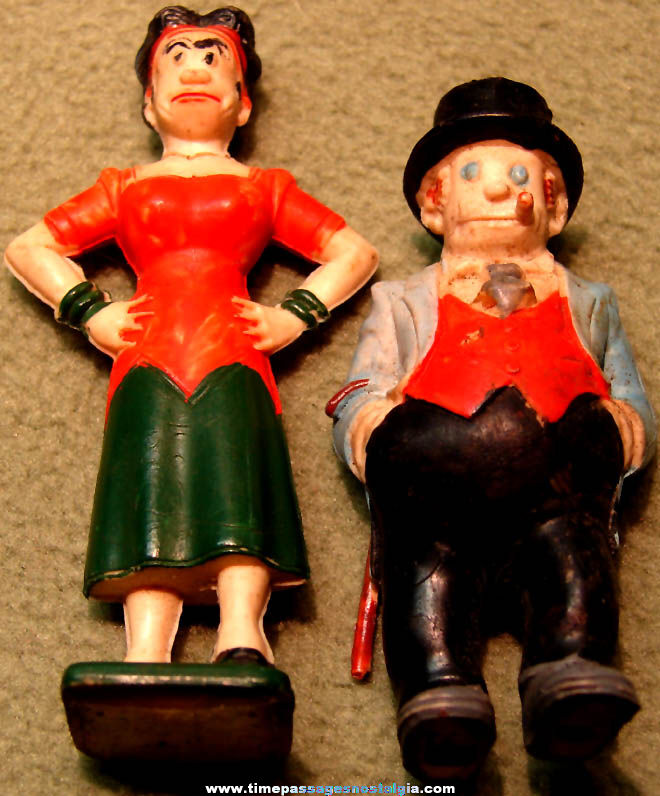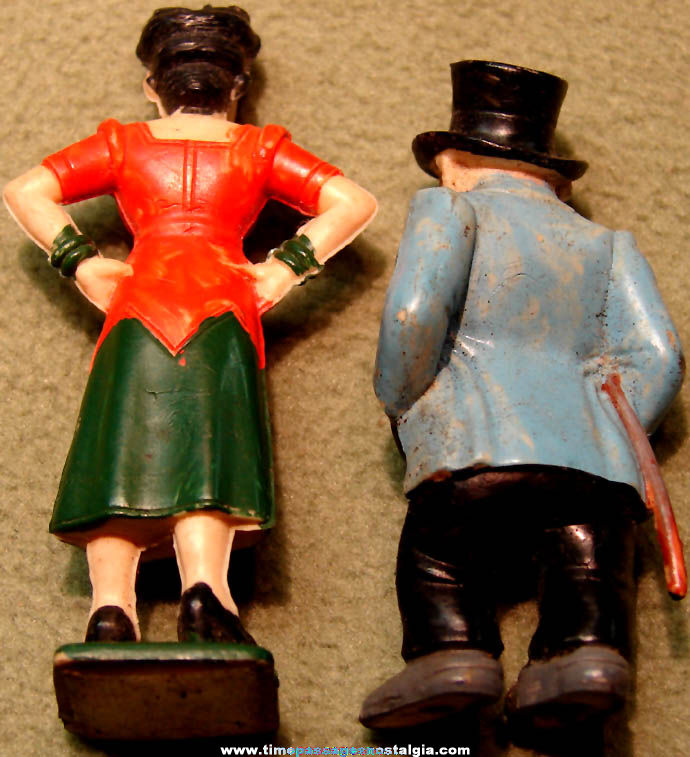
 | Item #k852 | 
Price: $24.99
$6 shipping & handling
For Sale
|
|
  | | | Any group of items being offered as a lot must be sold as a lot. | | Quality Packing And
Postal Insurance | You don't have to be an eight year old to enjoy having
a childhood treasure. | It's never too late to
have a happy childhood! | Great memories
make great gifts! | All Original Items.
No Reproductions | | We have an extensive inventory that is not yet on our web site. If there is something you are looking for and did not find, please send us your wish list. | | Combined Shipping And Handling | | Unique & Fun Nostalgic Items |
| | | | The pictures below show larger front and back views of the Old Painted Jiggs & Maggie Bringing Up Father Comic Strip Character Play Set Figures in this lot. These playset figures are not dated but they are believed to be from the 1950s by Marx Toys. The Jiggs figure is marked ''GERMANY'' on the bottom and Maggie is not marked. We do not know if these are factory painted or not, because they were also available in solid colors as well. The Jiggs figure measures about 2-1/4'' tall and Maggie measures about 2-5/8''. They appear to be in excellent condition as pictured. Below here, for reference, is some additional information from the ''Bringing Up Father'' comics: Bringing Up Father
From Wikipedia, the free encyclopedia Author: George McManus
Current status / schedule: Defunct
Launch date: 1913
End date: 2000
Alternate name: Jiggs & Maggie
Syndicate: King Features Syndicate
Genre: Humor Bringing Up Father was an influential American comic strip created by cartoonist George McManus (1884 - 1954). Distributed by King Features Syndicate, it ran for 87 years, from January 12, 1913, to May 28, 2000.
Many readers, however, simply called the strip ''Jiggs and Maggie'' (or ''Maggie and Jiggs''), after its two main characters. According to McManus, he introduced these same characters in other strips as early as November 1911.The humor centered on an immigrant Irishman named Jiggs, a former hod carrier who came into wealth in the United States by winning a million dollars in a sweepstakes. Now nouveau riche, he still longs to revert to his former working class habits and lifestyle. His constant attempts to sneak out with his old gang of boisterous, rough edged pals, eat corned beef and cabbage (known regionally as ''Jiggs dinner'') and hang out at the local tavern were often thwarted by his formidable, social climbing (and rolling pin wielding) harridan of a wife, Maggie, their lovely young daughter, Nora and infrequently their lazy son Ethelbert later known as just Sonny. The strip deals with ''lace curtain Irish'', with Maggie as the middle class Irish American desiring assimilation into mainstream society in counterpoint to an older, more raffish ''shanty Irish'' sensibility represented by Jiggs. Her lofty goal, frustrated in nearly every strip, is to bring father (the lowbrow Jiggs) ''up'' to upper class standards, hence the title, Bringing Up Father. The occasional malapropisms and left footed social blunders of these upward mobiles were gleefully lampooned in vaudeville, popular song, and formed the basis for Bringing Up Father. The strip presented multiple perceptions of Irish Catholic ethnics during the early 20th century. Through the character Jiggs, McManus gave voice to their anxieties and aspirations. Varied interpretations of McManus's work often highlight difficult issues of ethnicity and class, such as the conflicts over assimilation and social mobility that second and third generation immigrants confronted. McManus took a middle position, which aided ethnic readers in becoming accepted in American society without losing their identity. A cross country tour that the characters took in September 1939 into 1940 gave the strip a big promotional boost and raised its profile in the cities they visited. |
|
Click on image to zoom.
  |